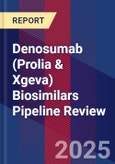This product provides basic information on approved drugs and drug candidates in research and development as biosimilar antibodies of Prolia & Xgeva (denosumab).
Denosumab is a human IgG2 monoclonal antibody with affinity and specificity for human RANKL (receptor activator of nuclear factor kappa-B ligand). Denosumab has an approximate molecular weight of 147 kDa and is produced in genetically engineered mammalian (Chinese hamster ovary) cells.
Denosumab binds to RANKL, a transmembrane or soluble protein essential for the formation, function, and survival of osteoclasts, the cells responsible for bone resorption. Prolia prevents RANKL from activating its receptor, RANK, on the surface of osteoclasts and their precursors. Prevention of the RANKL/RANK interaction inhibits osteoclast formation, function, and survival, thereby decreasing bone resorption and increasing bone mass and strength in both cortical and trabecular bone.
Denosumab has been developed by Amgen and is commercialized by Amgen, Daiichi Sankyo (Japan rights) and BeiGene (only for Xgeva) under different brand names, depending on indication and territory. BeiGene began marketing Xgeva in China in July 2020.
This product consists of:
- Competitors described in a tabular format covering drug code/INN, target(s)/MoA, class of compound, territory of main competitor, indication(s) & R&D stage.
- Project History with link to source of information (press release, homepage, abstracts, presentations, annual reports etc).
- One-month online access to the publisher’s database for TSLP inhibitors (prerequisite: access to internet).
Denosumab is a human IgG2 monoclonal antibody with affinity and specificity for human RANKL (receptor activator of nuclear factor kappa-B ligand). Denosumab has an approximate molecular weight of 147 kDa and is produced in genetically engineered mammalian (Chinese hamster ovary) cells.
Denosumab binds to RANKL, a transmembrane or soluble protein essential for the formation, function, and survival of osteoclasts, the cells responsible for bone resorption. Prolia prevents RANKL from activating its receptor, RANK, on the surface of osteoclasts and their precursors. Prevention of the RANKL/RANK interaction inhibits osteoclast formation, function, and survival, thereby decreasing bone resorption and increasing bone mass and strength in both cortical and trabecular bone.
Denosumab has been developed by Amgen and is commercialized by Amgen, Daiichi Sankyo (Japan rights) and BeiGene (only for Xgeva) under different brand names, depending on indication and territory. BeiGene began marketing Xgeva in China in July 2020.
- Prolia (Pralia in Japan) is approved for the treatment of osteoporosis in postmenopausal women and for bone loss in adult men and women at increased risk of fracture.
- Xgeva (Ranmark in Japan) is approved for prevention of skeletal-related events such as pathological fractures in adults with advanced malignancies involving bone. It is also indicated for the treatment of giant cell tumor in bone.








